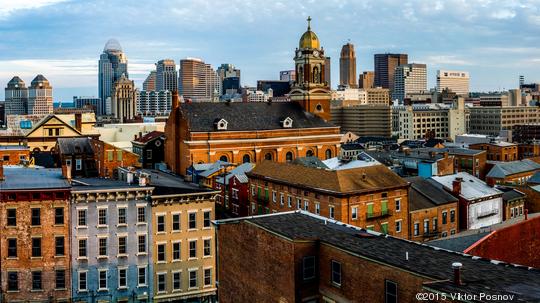
From health care to hospitality, Covid-19 is sparing few industries, and those hardships include the country’s entrepreneurial ecosystem. At least 50 startups have reported cutting or furloughing over 6,000 jobs, per a New York Times report. Funding for new companies is also mostly paused, and IPO plans are on hold.
At least, that’s what’s happening in Silicon Valley and the rest of the country. How is Covid-19 affecting startups and innovators here in the Queen City? The outcomes are similar but on a smaller scale.
CincyTech CEO Mike Venerable told Cincy Inno that the startups in his organization are working to cope with Covid-19 and its effect on their businesses.
"Liquidity is the biggest threat to any startup or growth company, and this is heightened in a crisis," Venerable said in an email. "We have worked with investors and co-investors to ensure our portfolio is not only in a position to survive, but grow and thrive as we navigate a world with Covid-19."
He added that many of CincyTech's companies are "on offense" and the remainder are well-prepared for the future.
CincyTech’s Return-2-X wave two survey, which polled hundreds of Ohioans about life during the pandemic, showed that 50% of respondents experienced at least one of three types of job disruption: employers closed, layoffs or reduced hours. At the same time, respondents say they are concerned about catching the virus, with nearly 80% saying they’re somewhat or very worried.
But, while Cincinnati may be experiencing effects similar to startup communities across the country, Cintrifuse VP of Communications Eric Weissmann says Cincinnati has proven it can weather tough storms time and again.
“In Cincinnati, we rode even-keel through the dot-com bust, we were conservative with the mortgage boom and bust; we leaned a little bit over but didn’t capsize,” he told Cincy Inno. “We’re never too proud, and I think some of that lends itself to this collaborative nature. You pull up your bootstraps and make it work.”
Weissman is not naïve to possible Covid-19 effects — he acknowledges the pandemic is wreaking havoc for many — but he sees Cincinnati’s strong corporate community with powerhouses like P&G and Kroger as strengths to help the city’s innovation ecosystem survive.
Pivoting to PPE
David Adams, the University of Cincinnati’s chief innovation officer, saw the Queen City’s entrepreneurial community prove its value at the beginning of the crisis. Innovators came forward with an idea to use the 1819 Innovation Hub’s Makerspace to create the face shields and personal protective equipment doctors and nurses needed to work safely.
Once in motion, nonprofit Easterseals, which provides services for those with disabilities, came forward and asked how they could help. The organizations now work in tandem, with UC creating the parts and Easterseals assembling them, before the final delivery to UC Health and Cincinnati Children’s.
“It’s a powerful example of how Covid-19 has created an environment where, because we have a physical infrastructure set up, parties can come together in new ways to solve problems,” Adams said.
Union Hall in OTR is another example of organizations pooling their resources where they’re needed most. Typically a co-working space, Union Hall transformed into a PPE-manufacturing facility within 48 hours. Polar3D and Cintrifuse collaborated by curating 3D printers to make hundreds of masks per day, according to WLWT. As UC supplies PPE to health care workers, Cintrifuse and Polar3D provide masks to police and fire departments, as well as nursing homes.
“The ability to adapt is a key characteristic of our community.”
And beyond PPE, even more strides are being made within the Uptown Innovation Corridor. Beth Robinson, president and CEO of Uptown Consortium, Inc., says these advancements will help the corridor accelerate even further.
“Many of the Uptown anchor institutions are participating in global research initiatives related to Covid-19 or developing innovative ways to address other issues released to the crisis,” she said. “We hope that this creates additional opportunities to attract biotech and health care companies to the Uptown Innovation Corridor to collaborate with the anchor institutions that are leading the fight against this pandemic.”
Cincinnati's 'new normal'
If there’s one thing startups and entrepreneurs are used to, it’s disruption. And CincyTech’s R[2]X survey found that disruption will likely be the “new normal” from now into the future. Fortunately, this is in the DNA of Cincinnati’s entrepreneurs.
“The ability to adapt is a key characteristic of our community,” Adams said. “Entrepreneurialism is a mindset. This is going to force all of us to be more adaptable to an ever-changing environment as the pace of change continues to accelerate. Clearly the social cost isn’t good, but it’s forcing acceleration and adaptability that will make us stronger.”
Beyond adaptability, what will this new normal look like, and when will it start? The R[2]X survey points to continued caution as the key to resuming business. Survey respondents said social distancing, screening and testing, and new procedures for identifying cases were all important steps toward resuming confidence in normal practice.
“Once reopened, Ohioans want social distancing and sanitization and processes to identify new Covid-19 cases to drive confidence in their return to previous activities,” the R[2]X survey presentation noted.
Union Hall, which reopened for coworking with mask, temperature-check, and social distancing guidelines in mid-May, is a good example of what this may look like — at least temporarily. Weissmann says their parameters were built with social distancing in mind; they’ll continue relaxing these strict guidelines as the data proves it’s safe to.
“One room for 50 people can now hold 15, and everything is spaced out 15 feet apart,” he said. “If everything goes well, we’ll consider opening up for more coworking residents, gradually easing back into this. We’re all doing the best we can.”
Robinson also anticipates the new normal will include a push for outdoor-focused development. “This situation has forced us — and others — to be more creative about how we approach development and design, especially office space,” she said. “It’s raising concerns that need to be addressed, such as safe access to recreational outdoor space and greenery. This reinforces our plans for the ecological greenway in the Corridor, and I’m hopeful it’ll push other people to think creatively about those spaces as well.”
Some businesses are growing
While many businesses are trying to find their footing, several local startups are poised for pandemic growth. Frayt, a same-hour delivery service, had to scale up rapidly as its services became more important than ever. They saw the need — home-delivery without the wait — and ensured consumers understood the potential solution.
"Entrepreneurs are even more important now. We need their creativity and optimism.”
Another local entrepreneur and University of Cincinnati professor Brett Harnett realized his offering filled a huge void: connection. HiLois, the private social support app built in tandem with the University of Cincinnati, helps families stay connected with elder loved ones, particularly those in nursing homes. While it’s still in its early stages, HiLois is gaining national recognition through publications like Forbes.
And as headlines continue to take a more positive tone, including major new investments, important new grants, and construction progressing on the Uptown Gateway development, it’s easy to feel optimistic about the future. But Weissmann hopes Cincinnati’s new normal incorporates key lessons for entrepreneurs and startups moving forward.
“As we emerge from this crisis, this is an opportunity for us to ask, 'Do all the pieces need to fit back the way they fit before?'" he said. “Let’s stress the importance of diversity and inclusion. Those things need to take an even more important role, and we need to lower the barrier of entry. Entrepreneurs are even more important now. We need their creativity and optimism.”








